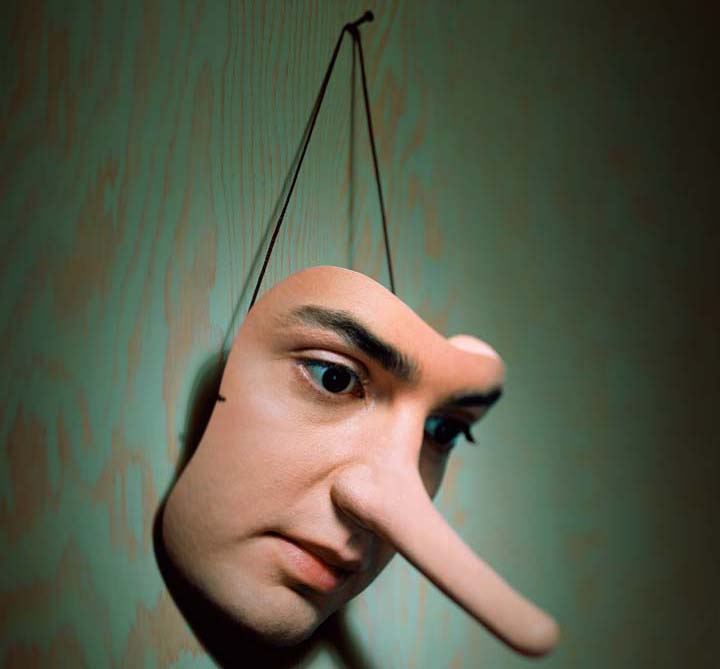The name of lying shepherd and Pinocchio is bad! why Because studies show that unfortunately most people lie many times during the day. At best, people lie at least 2-3 times a day. For example, your friends and colleagues usually tell big and small lies in their communication throughout the day and even in short 10-minute conversations.
You, dear reader, are finally someone’s friend and colleague. If we pay attention to our behavior, we will realize that sometimes we unnecessarily avoid telling the truth and put ourselves and others into a challenge of erosion. After 253 studies, researchers at the University of California have found that we are only able to detect 53% of the lies that are told to us. It means that it is almost equivalent to the probability of predicting a lion or a line of coins! In this lie market, how to deal with liars is very important.
Another scary point in the game of lies and truth is that even police officers, professional interrogators and judges only distinguish lies from the truth 60% of the time, and there is no certainty. There are many ways to deal with liars, depending on the situation. Stay with us.
Sometimes the lie we hear is so big and horned that any person can recognize it. In these cases, the type of behavior with the lying person and managing the conversation is very simple. But sometimes the lie we hear is not so clear, and only with a reasonable percentage of doubt and pessimism can we not fall into the liar’s trap.
Of course, pessimism is not a desirable feature at all, but combining a percentage of it with realism makes us better manage dealing with liars in our lives. What should we do after we feel that what we heard was nothing but a lie? Where can we learn how to deal with liars? Should we directly tell the person to lie less? Should we tell him why you are not telling the truth or simply ignore him and ignore the lie he told? Nietzsche says: “I am not sad that you have lied, it makes me despair that I will no longer trust you.”
1. Know the rules of the game
Sometimes revealing the truth and exposing people’s hands has much worse consequences than hearing that lie and not admitting it. You don’t need to react immediately when you feel that someone is lying. Consider the situation you are in. What is the reason for lying? What is the result of pursuing the truth? Sometimes it is better to remain silent in front of the lying person and not show any reaction.
2. make a joke
Some liars weave such big lies that they are not only unbelievable but also laughable and ridiculous. These lies can be identified from 8 miles away. In these cases, take help of jokes. For example, say: “Isn’t your nose twenty centimeters longer?” Or other jokes that put the lying person in a new situation that allows him to joke and can tell the truth in a behavioral turn and put everything as a joke. This kind of behavior with liars will prevent you from hearing other lies and protect the person’s reputation.
3. Make your way to it

Another way to deal with liars is to let them in. By using this method, one is forced to confess and at the same time self-esteem And his reputation is also preserved. Pretend your memory doesn’t help and ask as many questions as you can. When you get into the details, the truth will soon be revealed.
4. Talk to the liar
If you think a little more carefully, you will definitely remember that your significant other also lies many times during the day. This feature is very undesirable and ugly, and many tragedies and problems have been caused by lying throughout history, but anyway, we all tell small and big lies more or less. Try to talk to the liar privately about the lie you heard and talk to him in a way that preserves his reputation. Remember, you must have enough reasons to prove your claim, because if you don’t provide enough evidence, he might blame everything on you and avoid telling the truth.
5. Take care of yourself

We all have the right to know the truth. No matter if the lie you heard is very big and visible or if it is told professionally and under the skin. Defend your right, but be aware that if you have decided to turn away the hand of a liar, consider the consequences of doing so. Fully measure the capacity of the person and the history of your relationships in order to protect your nerves and feelings. What does that mean? That is, taking into account the situation you are in, manage your behavior with liars in such a way that the dignity of both of you is preserved and the problem is solved. Don’t let the lies you heard lead to arguments and get on your nerves. Put yourself in the person’s place and try to find the root and cause of his lying, knowing that lying is an inappropriate move.
Some people lie out of fear or lack of self-confidence. But some others are professional and vengeful liars who have spent many years of their lives with lies and what benefits and achievements they have not achieved. Dealing with liars has many complications. Being able to correctly identify which method to choose to deal with a liar depends largely on your circumstances. According to Nietzsche, the most unfortunate result of a lie is the loss and severing of the bonds of trust between people.
How to talk with liars?

We all have to deal with liars in our lives. What should we do in such a situation? We have 10 practical, step-by-step suggestions.
Frequently asked questions about lies and dealing with liars
Taken from:linkedin.com
Source Link






